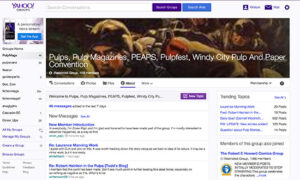 ThePulp.Net first appeared online just over 20 years ago as .Pulp on the old America Online dial-up service.
ThePulp.Net first appeared online just over 20 years ago as .Pulp on the old America Online dial-up service.
By the time I started ThePulp.Net/.Pulp, I had been online for a number of years. First through a FreeNet in Tallahassee, Fla., which provided access to the UseNet, including alt.pulp and alt.fan.doc-savage. At some point in the early ’90s, we signed up for AOL, which eventually included forums for pulps and Doc Savage.
This was in the long-ago days of dial-up modems, spending short periods of time online, and being interrupted when someone called the house and the modem dropped the connection because of call waiting. (That seems ancient history in these days of always-connected internet in your pocket.)
I had learned HTML at work, so naturally I was eager to put it to work for fun. At first, I wanted to build a site devoted to The Shadow, then Doc Savage. But after finding that others had already created those online, I got the idea to start a clearinghouse for pulp websites — providing curated links divided into topics.
It was discovering fellow pulp fans online that really spurred me into creating ThePulp.Net, but it also rejuvenated an old interest in the pulps. Those online forums — on both UseNet and AOL — were great places to talk about the pulp magazines, pulp characters, authors, and artists with other folks who actually cared about such things.
A few years passed, and activity in both AOL’s and UseNet’s forums ebbed. The alt.horror.cthulhu newsgroup has been rather active the past year or so, but alt.pulp had 58 posts in 2015 — less than half as many as in a week 12 years earlier.
Pulp fans began moving to the various Yahoo Groups around 2000. Just as the pulp magazines became more specialized in topic, the Yahoo Groups became more specific, too.
But by the end of the first decade of the new century, participation in many of the pulp groups at Yahoo peaked. At the same time, Facebook was gaining ground as the social media giant, and pulp groups began forming there. And by 2013, the pulp groups at Yahoo began a rapid decline in activity.
The Flearun group on Yahoo, for instance, was officially shuttered in March by founder Chuck Welch in favor of its Facebook version. On Yahoo, Flearun counted over 580 members, while the Facebook version lists over 830 members (as of this writing).
A few of the Yahoo Groups are hanging in there. PulpMags has a steady stream of discussions, though at a much-reduced rate compared with six years ago. And FictionMags, which has a broader interest than just the pulps, is thriving.
As one online community wanes, another surges, then circumstances repeat.
To compound matters, the future of Yahoo looks uncertain. It is courting buyers, but the main selling point seems to be its online advertising base. I seriously doubt potential buyers are even thinking about its online groups.
It would be a terrible loss if Yahoo’s new owners just decide to pull the plug on the groups. Thousands of conversations about the pulp magazines — and information about them — could just disappear.
I guess that’s the march of progress.



Remember alt.pulp. I created and maintained the alt.pulp FAQ for several years until I lost my access to Usenet.
Alt.pulp is still there. Nine posts so far this year, including ones by That’s Pulp‘s John Olsen, Mike Chomko, a few others, and me.
The drop in activity combined with the fear Yahoo’s sale would end the group was my prime motivators.
I figured 17 years was a good run for a spam-free discussion group. 🙂
I don’t remember our final post count, but I think our best month was 779 posts. Of course we didn’t average that.
What I dislike about Yahoo and Facebook…and the usenet groups…was the difficulty in archiving the messages.
If I could easily move the Flearun fans to an easily archived message system on the HTC I would.
It is a shame that there appears to be no way to create a downloadable archive for the groups on Yahoo or Facebook.
I’m fairly new to involvement in the world of the pulps. But I’m sure a similar situation to what you described occurred in the world of comics.
The “nonarchievability” (or that only piecemeal, laborious saving was possible) of comics message boards meant that when those in control pulled the plug, hundreds of thousands of comments — shallow, fascinating, dashed-out, carefully thought out and crafted, combative, illuminating, trivial, of historic importance — went down the “memory hole.”
Hugely successful comics writer Brian Michael Bendis decided to jettison his “Jinxworld” message board, and everything that had been contributed to it for 22 years blinked out of existence. As described in The Comics Beat, “a lot of comics history is vanished in a way that print just doesn’t offer.”
After my heavy involvement in “The Comics Journal” message board for over 10 years, its owners similarly pulled the plug. Not long thereafter, they scrubbed out of existence what archived remnants still existed. In my requiem to that message board at The Hooded Utilitarian, I had suggested that those who’d like to judge for themselves whether or not the TCJ MB was the den of iniquity its masters portrayed it as could check out the archives still extant. But now those are down the “memory hole” too; so those who most loudly proclaim that it was vileness incarnate control how it will be perceived.
(I imagine that pulp-related message boards and other online groups, presumably with a membership much older on the average than those devoted to comics, are more prone to consistent civility. Certainly the pulp Facebook sites I’ve visited daily for over a year now have been…)
How ironic that comments in pulp and comics fanzines from the ’70s have survived, while similar content in 21st-century online technology has disappeared.